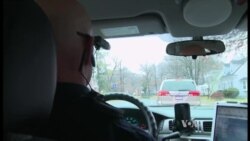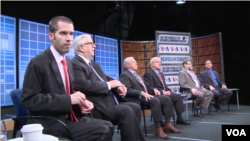Video of police action – from officers wearing body cameras to citizens using cell phones – is leading to a tense new dynamic between police and the American public that has in several instances resulted in protests and outcry.
“We're really living in a revolutionary time,” said Jay Stanley, a policy analyst with the American Civil Liberties Union and one of several panelists at a forum on Wednesday hosted by the Voice of America and the Newseum in Washington, D.C.
“Photography is a form a power,” he said. “What we're seeing is a power struggle.”
In the past, eyewitness testimony was one of the primary means of persuading the public of a person’s guilt or innocence, but that testimony could often be disputed. Now, ubiquitous mobile devices with cameras provide evidence that is far more convincing – it’s hard to dispute what people can see for themselves.
An officer in McKinney, Texas, last week was videotaped using what many called excessive force against an African-American teenage girl after a scuffle broke out at a pool party. The video is the latest of several that have emerged in recent months that raise questions of racial bias by police toward African-Americans.
The VOA/Newseum panel included active police, former law enforcement officers, academics and free speech advocates.
Stanley, who works at the ACLU Speech, Privacy and Technology Project, cited two main issues with body cams: when they should be turned off and on - something about which he said there should be little discretion allowed on the part of the police - and who gets access to the videos.
“Civilian footage is a different thing,” he said. “It’s protected by the First Amendment.”
The panelists agreed that citizens have the right to film police as long as they’re not interfering in the officer’s job, but added that police departments are still coming to grips with the fact that so many people now have cameras on the mobile phones.
Body cameras mounted to police officers to record interaction with the public were also generally considered a good thing, but again, there are many issues to be worked out.
“We are a profession that is in such public view, and everyone wants to hold us accountable,” said Roberto Villasenor, the chief of police in Tucson, Arizona, whose department is experimenting with body cameras. "Tech has taken such a quick turn. [We are] still struggling with the issues."
Some of those issues include when police turn the cameras on and off, whether the video collected would be made public, as well as concerns about officers’ privacy when not interacting with the public.
While Villasenor is generally in favor of body cameras, he does see a dilemma.
“Cameras can be very positive for police in holding police accountable,” he said. “Everyone behaves better when they know they're being recorded.”
But he cautioned that some people might try to profit from camera footage by requesting every video a police department had and posting them online, something he said “could be burdensome” financially.
The pervasive presence of cameras could also have unintended consequences.
For one, Villasenor said, since there isn’t really a distinction between credentialed media and someone with a cellphone. The police could decide to keep everyone away from a crime scene, which would result in less information seeing daylight.
He also said that a video like the Texas pool party film, aired countless times on television and readily available online, “aggravates the tension” felt in some communities between police and the community.
Stanley said the videos have also “opened a lot of people's eyes about what's going on.”
While body cams are a relatively new phenomenon, some studies are showing their benefits.
In a definitive report prepared for the U.S. Department of Justice (DOJ) last year, body cameras were shown to reduce the incidence of the police using force by 60 percent in the city of Rialto, California. Complaints against police officers there also plummeted 88 percent.
“Advances in technology have had a dramatic effect on relations between police and the public, and a lot of heated words have recently been said on those relations,” said Kelu Chao, acting director of VOA.“We hope that this conference, which brings together experts familiar with this most important issue, will generate more light.”







